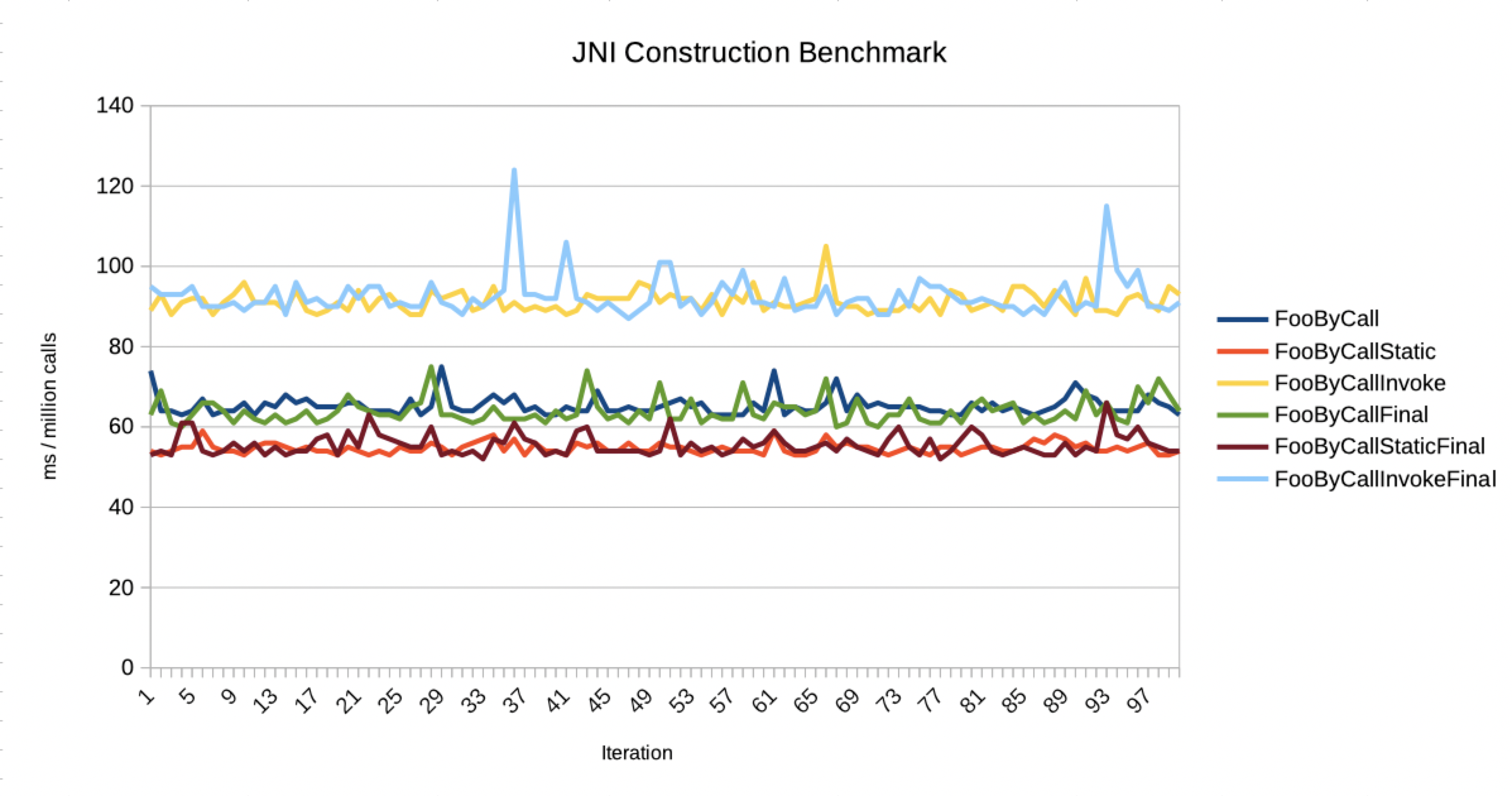The code contrasts three different approaches to constructing a Java Object that wraps a C++ object (which it has to construct). Such a scenario is common when writing a Java API wrapper for an existing C++ project.
From Java we call a JNI C++ member function to construct the C++ object and
return a jlong which represents the memory pointer to the C++ object.
public class FooByCall extends NativeBackedObject {
public FooByCall() {
super();
this._nativeHandle = newFoo();
}
private native long newFoo();
...jlong Java_com_evolvedbinary_jni_consbench_FooByCall_newFoo(JNIEnv* env, jobject jobj) {
consbench::Foo* foo = new consbench::Foo();
return reinterpret_cast<jlong>(foo);
}Similar to Scenario 1, except that we use a static call to a JNI C++ function.
public class FooByCallStatic extends NativeBackedObject {
public FooByCallStatic() {
super();
this._nativeHandle = newFoo();
}
private static native long newFoo();
...jlong Java_com_evolvedbinary_jni_consbench_FooByCallStatic_newFoo(JNIEnv* env, jclass jcls) {
consbench::Foo* foo = new consbench::Foo();
return reinterpret_cast<jlong>(foo);
}Similar to Scenario 1, however instead of returning a jlong pointer, we
instead in C++ find the _nativeHandle member of the calling Java object, and
then directly set the long field from C++.
public class FooByCallInvoke extends NativeBackedObject {
public FooByCallInvoke() {
super();
newFoo(); //the native method, will find _nativeHandle from the class and set it directly
}
private native void newFoo();
...void Java_com_evolvedbinary_jni_consbench_FooByCallInvoke_newFoo(JNIEnv* env, jobject jobj) {
consbench::Foo* foo = new consbench::Foo();
//set the _nativeHandle in Java
consbench::FooByCallInvokeJni::setHandle(env, jobj, foo);
}
template<class PTR, class DERIVED> class FooJniClass {
public:
// Get the java class id
static jclass getJClass(JNIEnv* env, const char* jclazz_name) {
jclass jclazz = env->FindClass(jclazz_name);
assert(jclazz != nullptr);
return jclazz;
}
// Get the field id of the member variable to store
// the ptr
static jfieldID getHandleFieldID(JNIEnv* env) {
static jfieldID fid = env->GetFieldID(
DERIVED::getJClass(env), "_nativeHandle", "J");
assert(fid != nullptr);
return fid;
}
// Get the pointer from Java
static PTR getHandle(JNIEnv* env, jobject jobj) {
return reinterpret_cast<PTR>(
env->GetLongField(jobj, getHandleFieldID(env)));
}
// Pass the pointer to the java side.
static void setHandle(JNIEnv* env, jobject jdb, PTR ptr) {
env->SetLongField(
jdb, getHandleFieldID(env),
reinterpret_cast<jlong>(ptr));
}
};
// The portal class for com.evolvedbinary.jni.consbench.FooByCallInvoke
class FooByCallInvokeJni : public FooJniClass<consbench::Foo*, FooByCallInvokeJni> {
public:
static jclass getJClass(JNIEnv* env) {
return FooJniClass::getJClass(env,
"com/evolvedbinary/jni/consbench/FooByCallInvoke");
}
};
Scenarios 4, 5, and 6 are similar to 1, 2, and 3 respectively, except that the
Java classes have been marked as final.
Test machine: MacBook Pro 15-inch 2019: 2.4 GHz 8-Core Intel Core i9 / 32 GB 2400 MHz DDR4. OS X 10.15.2 / Oracle JDK 8.
$ java -version
java version "1.8.0_221"
Java(TM) SE Runtime Environment (build 1.8.0_221-b11)
Java HotSpot(TM) 64-Bit Server VM (build 25.221-b11, mixed mode)$ clang --version
Apple clang version 11.0.0 (clang-1100.0.33.16)
Target: x86_64-apple-darwin19.2.0
Thread model: posix
The com.evolvedbinary.jnibench.consbench.Benchmark class already calls each
scenario 1,000,000 times, so for the benchmark we repeated this 100 times and
plotted the results.
The difference between the non-final (Scenarios 1 - 3) and the final (Scenarios 4 - 6) class versions is so small that it could easily be accounted for by system noise.
Scenario 2 and 5 - By Call, Static, appear to have the lowest JNI overhead for constructing C++ objects from Java.
